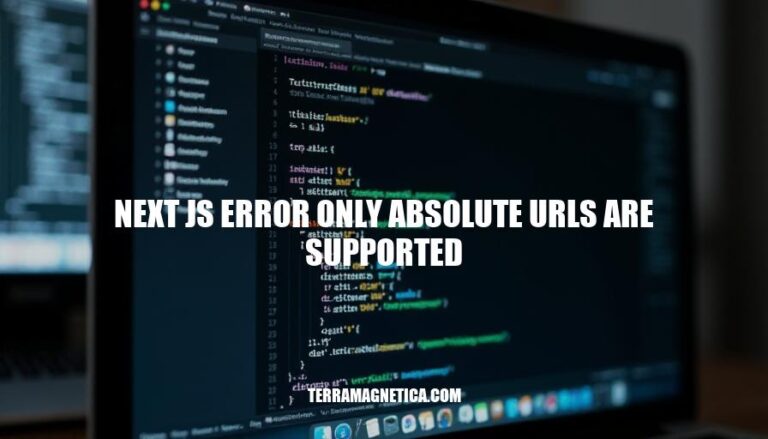


The “only absolute URLs are supported” error in Next.js typically occurs when developers use relative URLs in contexts like data fetching, API routes, or redirects. This error arises because Next.js requires the full URL, including the protocol and domain, to properly locate resources. Understanding and resolving this error is crucial for developers to ensure their applications function correctly and securely.
The error message “only absolute URLs are supported” in Next.js typically occurs when you use a relative URL in a context where an absolute URL is required, such as in API requests or redirects.
An absolute URL provides the complete address of a resource on the internet. It includes:
http, https).example.com)./path/to/resource).For example, https://example.com/path/to/resource is an absolute URL. It can be used from any location to access the specified resource.
A relative URL specifies a resource’s location relative to the current page’s URL. It does not include the protocol or domain name, only the path.
For example, if the current page is https://example.com/folder/page.html, a relative URL like ../image.jpg points to https://example.com/image.jpg.
In Next.js, using absolute URLs ensures that the application can correctly locate and fetch resources, regardless of the current page’s location.
Here are common scenarios where developers might encounter the “Next.js error: only absolute URLs are supported”:
API Calls:
// Incorrect
const res = await fetch('/api/data');
// Correct
const res = await fetch('https://example.com/api/data');
Redirects:
// Incorrect
res.redirect('/home');
// Correct
res.redirect('https://example.com/home');
Data Fetching:
// Incorrect
const data = await fetch('/products');
// Correct
const data = await fetch('https://example.com/products');
Middleware:
// Incorrect
NextResponse.redirect('/login');
// Correct
NextResponse.redirect('https://example.com/login');
Image Optimization:
// Incorrect
<Image src="/images/pic.jpg" alt="Picture" />
// Correct
<Image src="https://example.com/images/pic.jpg" alt="Picture" />
Static Site Generation (SSG):
// Incorrect
const res = await fetch('/api/posts');
// Correct
const res = await fetch('https://example.com/api/posts');
Server-Side Rendering (SSR):
// Incorrect
const res = await fetch('/api/user');
// Correct
const res = await fetch('https://example.com/api/user');
These examples illustrate the importance of using absolute URLs in various Next.js contexts to avoid this common error.
Sure, here are the steps to troubleshoot and resolve the “Next.js error: only absolute URLs are supported”:
Identify the Error Source:
fetch or API calls. The error typically occurs when using relative URLs (e.g., /api/data) instead of absolute URLs (e.g., https://example.com/api/data).Locate the Problematic Code:
fetch calls, axios requests, or any other HTTP requests in your Next.js project. These are often found in API routes, getServerSideProps, getStaticProps, or client-side components.Update to Absolute URLs:
http or https) and the domain name.// Incorrect
const res = await fetch('/api/data');
// Correct
const res = await fetch('https://example.com/api/data');
Use Environment Variables:
.env.local file in your project root and define your base URL.NEXT_PUBLIC_API_BASE_URL=https://example.com
const res = await fetch(`${process.env.NEXT_PUBLIC_API_BASE_URL}/api/data`);
Check Middleware and Redirects:
middleware.ts:import { NextResponse } from 'next/server';
export function middleware(req) {
const url = req.nextUrl.clone();
url.pathname = '/new-path';
return NextResponse.redirect(url);
}
Test Your Changes:
Review Documentation:
By following these steps, you should be able to identify and fix the “only absolute URLs are supported” error in your Next.js application.
To avoid the “only absolute URLs are supported” error in Next.js, follow these best practices:
Use Absolute URLs in Fetch Requests: Always include the full URL with the protocol (e.g., https://example.com/api/data). Avoid relative URLs like /api/data.
Environment Variables: Store your base URL in environment variables. This helps manage different environments (development, staging, production) easily.
const baseUrl = process.env.NEXT_PUBLIC_API_BASE_URL;
const response = await fetch(`${baseUrl}/api/data`);
Utility Functions: Create a utility function to construct absolute URLs. This ensures consistency across your project.
const getAbsoluteUrl = (path) => `${process.env.NEXT_PUBLIC_API_BASE_URL}${path}`;
const response = await fetch(getAbsoluteUrl('/api/data'));
Next.js Configuration: Use the next.config.js file to define your base URL and other configurations.
module.exports = {
env: {
NEXT_PUBLIC_API_BASE_URL: 'https://example.com',
},
};
SSR and CSR Considerations: Ensure that your URLs are absolute in both server-side rendering (SSR) and client-side rendering (CSR) contexts. Use the same environment variables and utility functions to maintain consistency.
Custom Server Setup: If using a custom server, ensure that all routes and redirects use absolute URLs.
By consistently applying these practices, you can avoid the “only absolute URLs are supported” error and maintain a robust Next.js project.
To resolve the “only absolute URLs are supported” error in Next.js, it’s essential to understand its causes and implement best practices.
By consistently applying these practices, you can avoid the “only absolute URLs are supported” error and maintain a robust Next.js project.